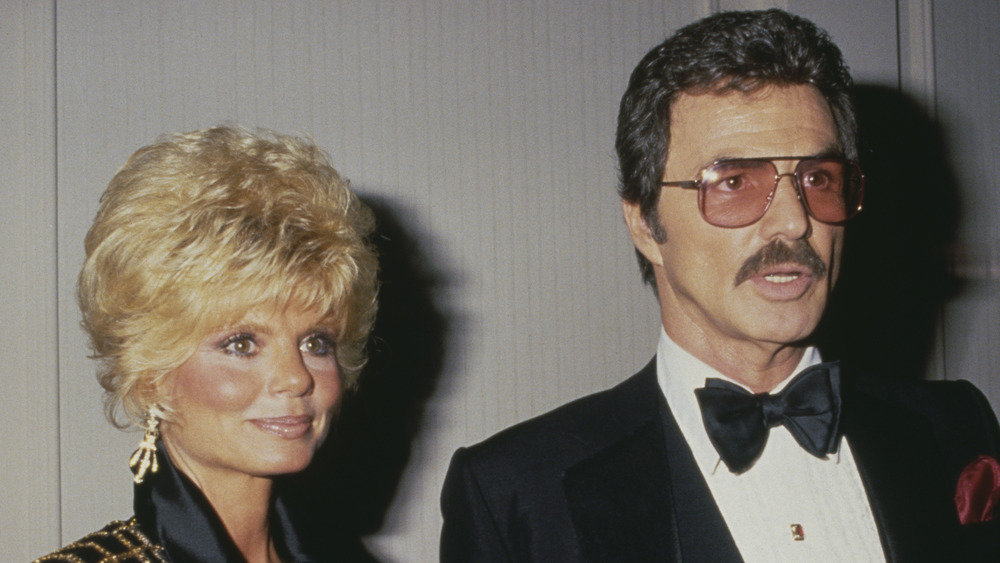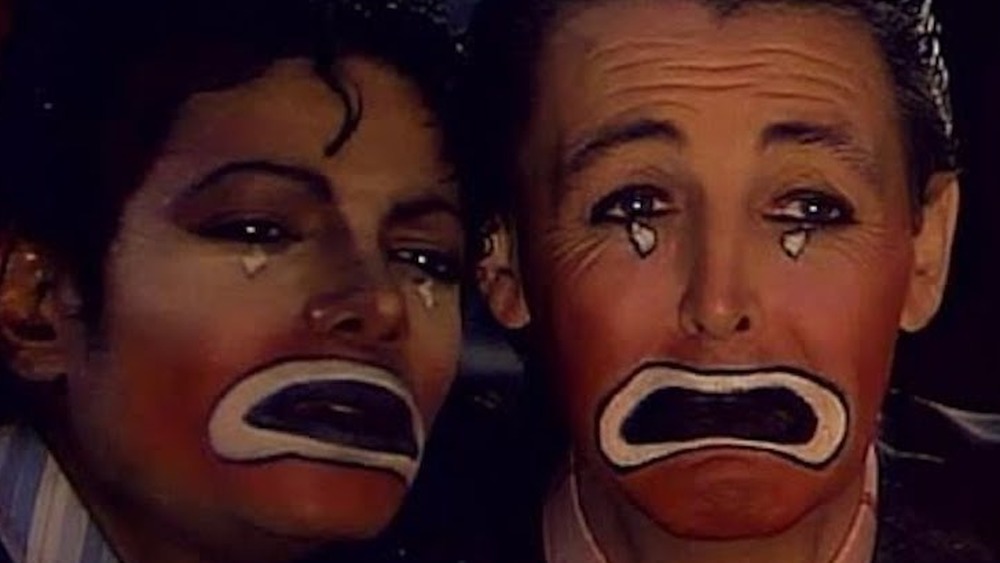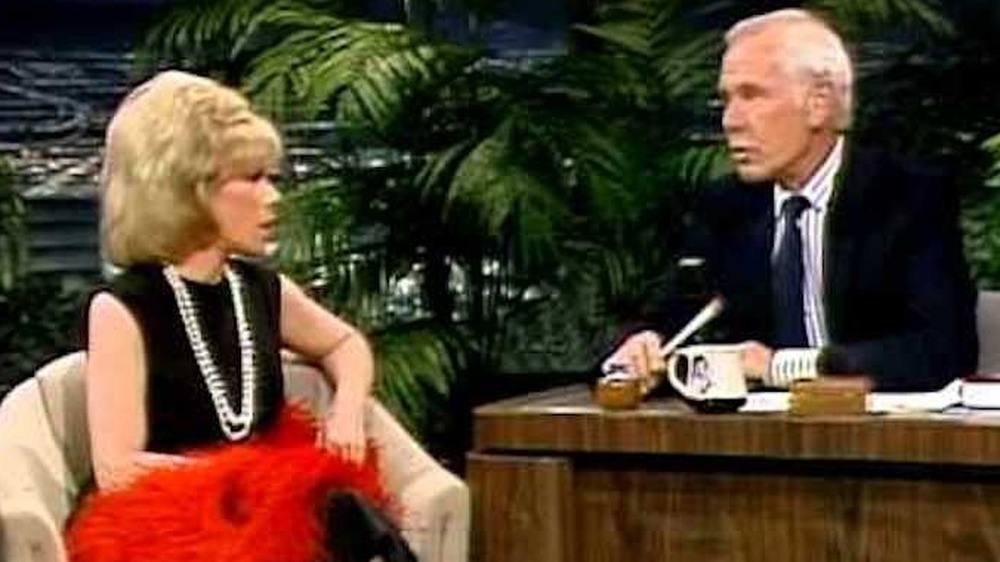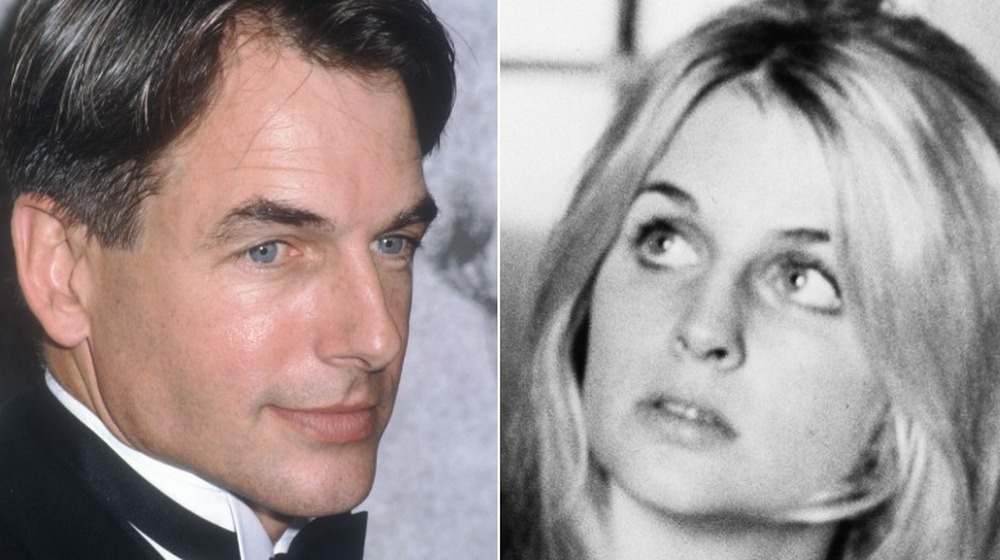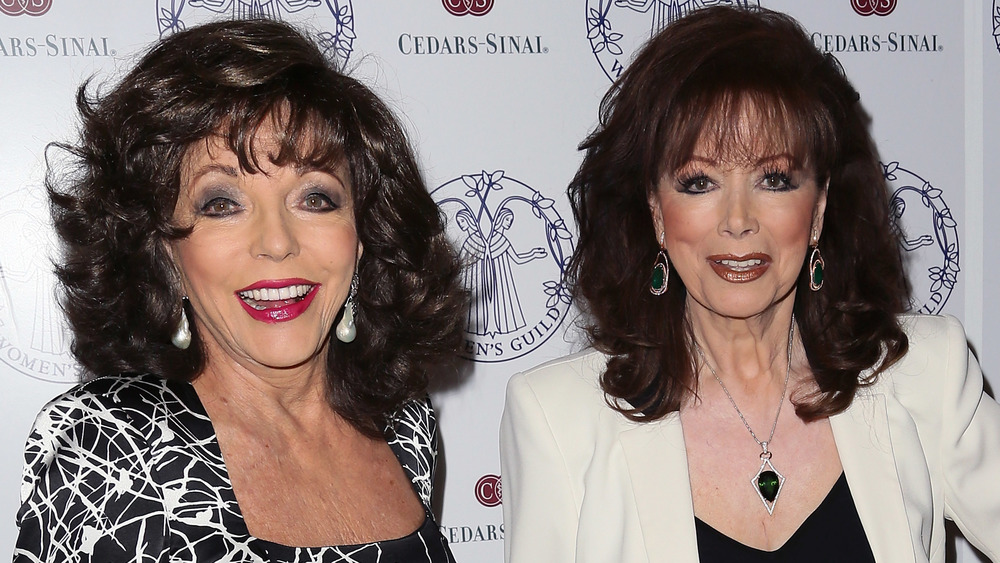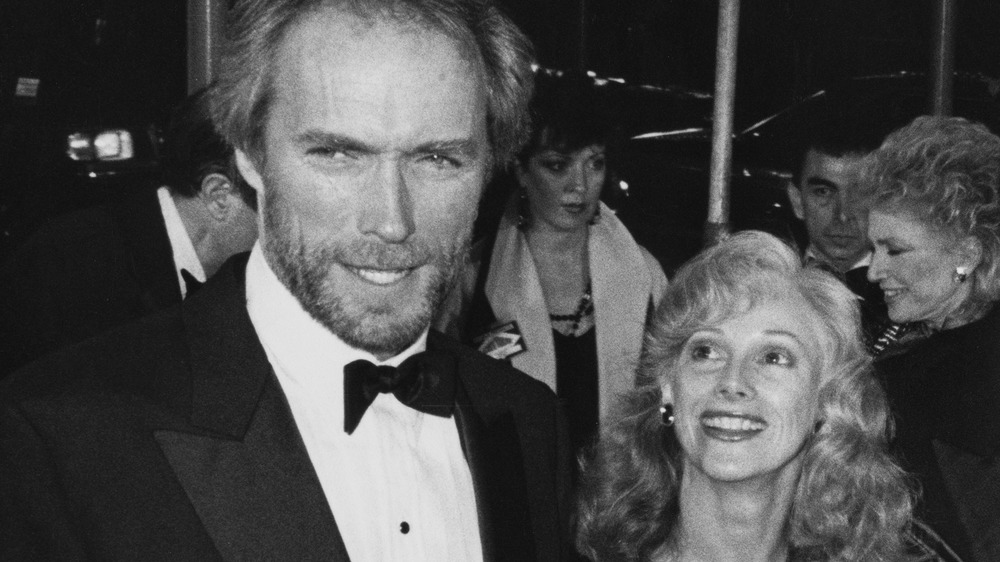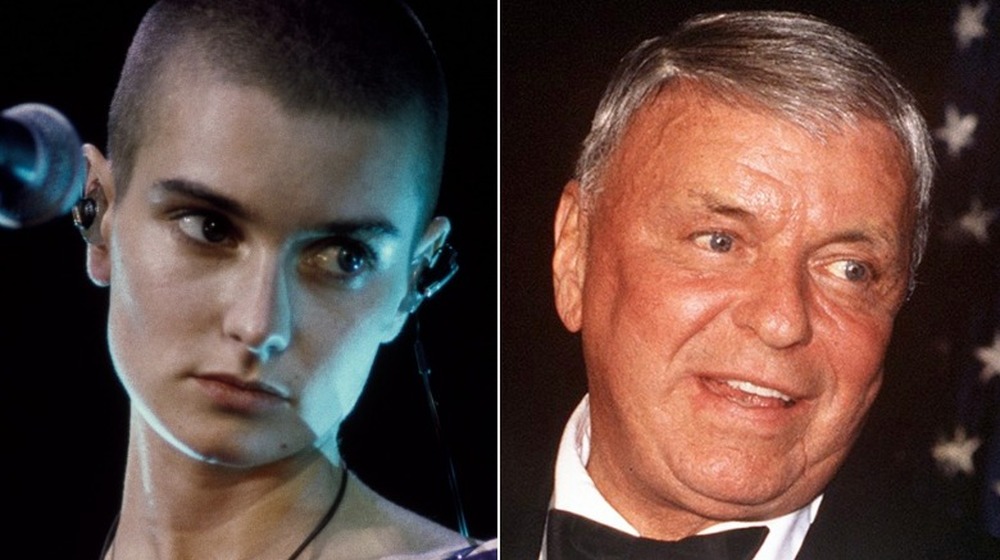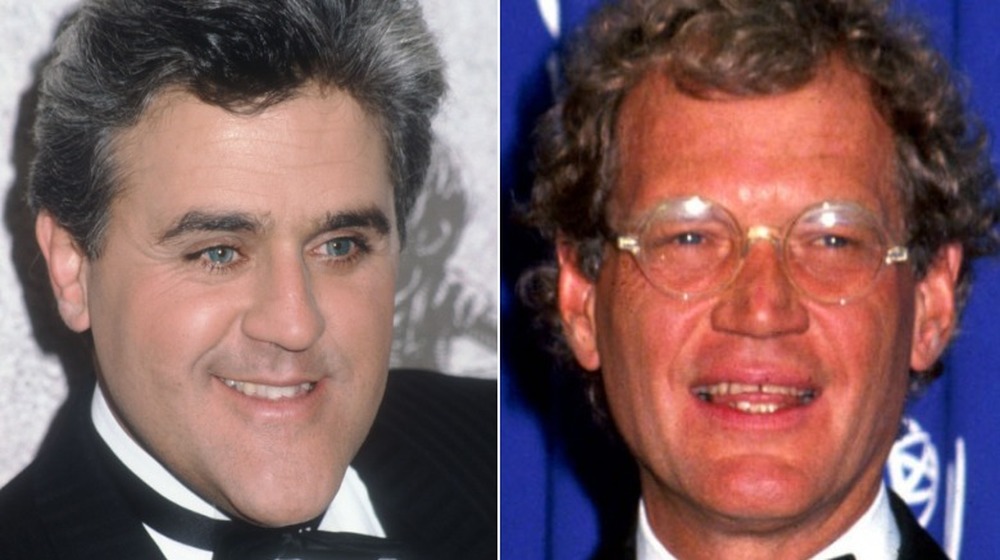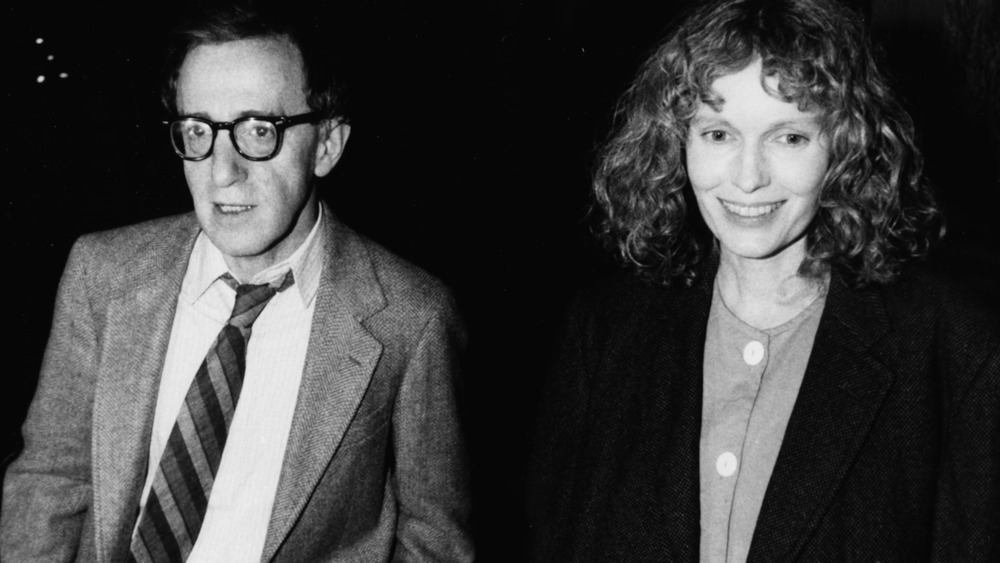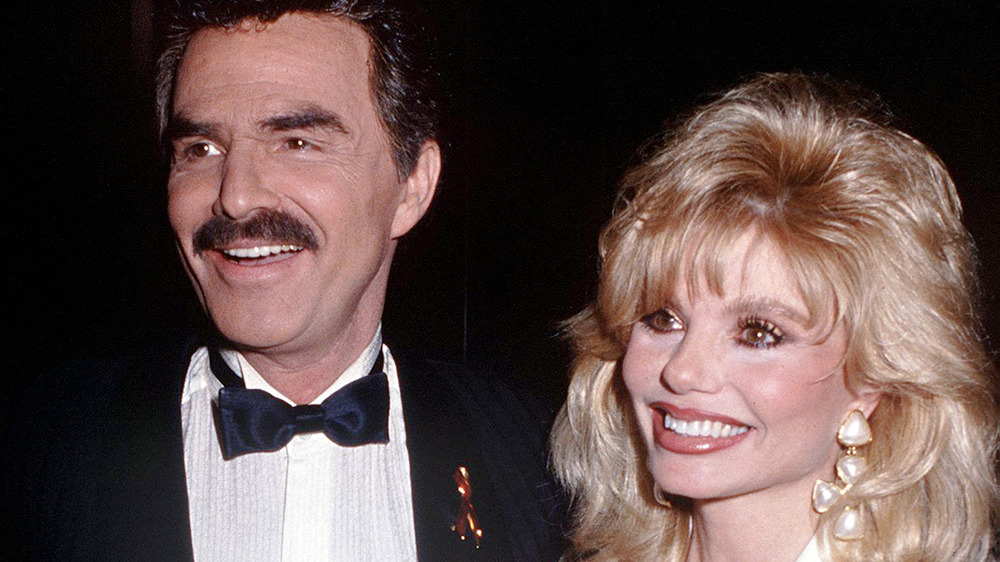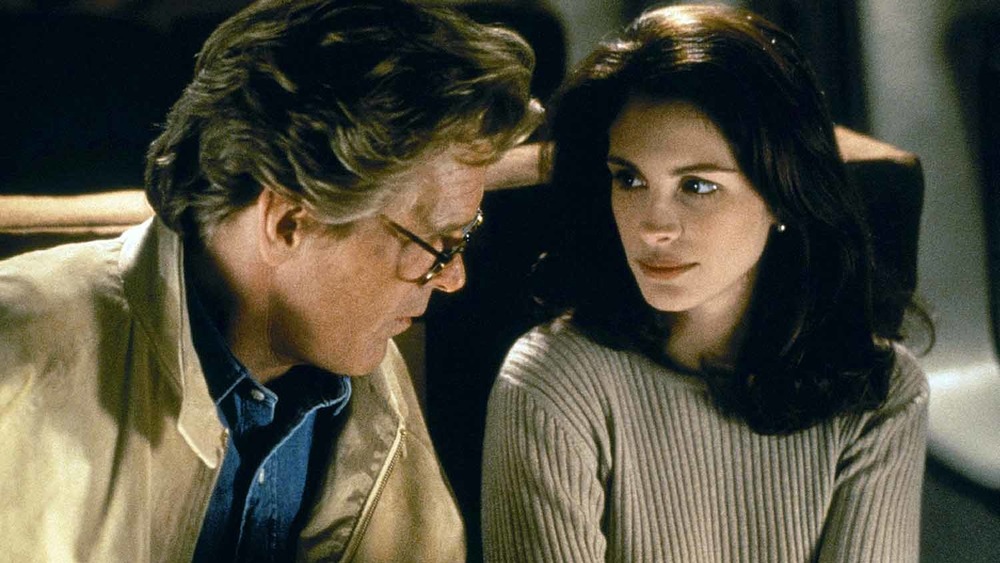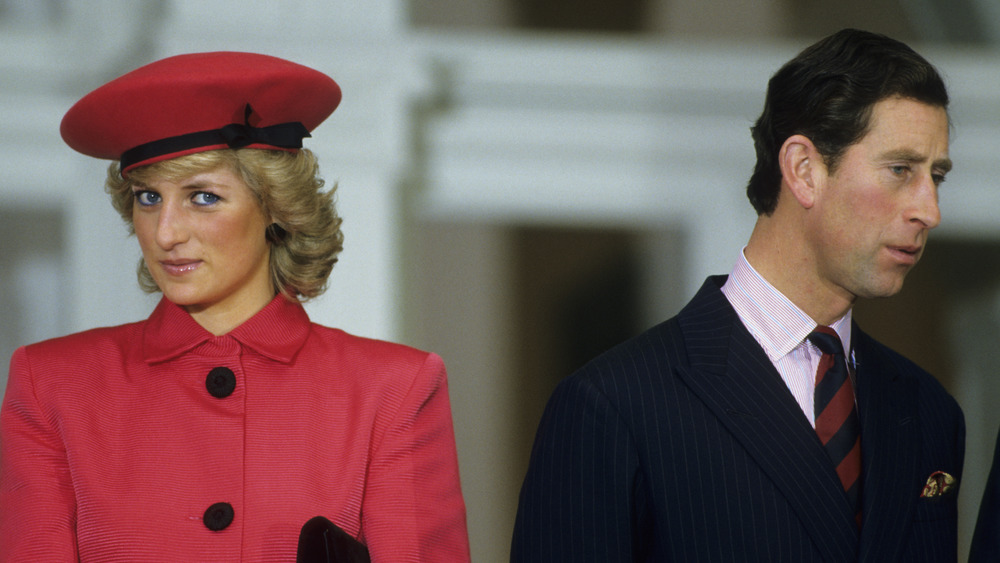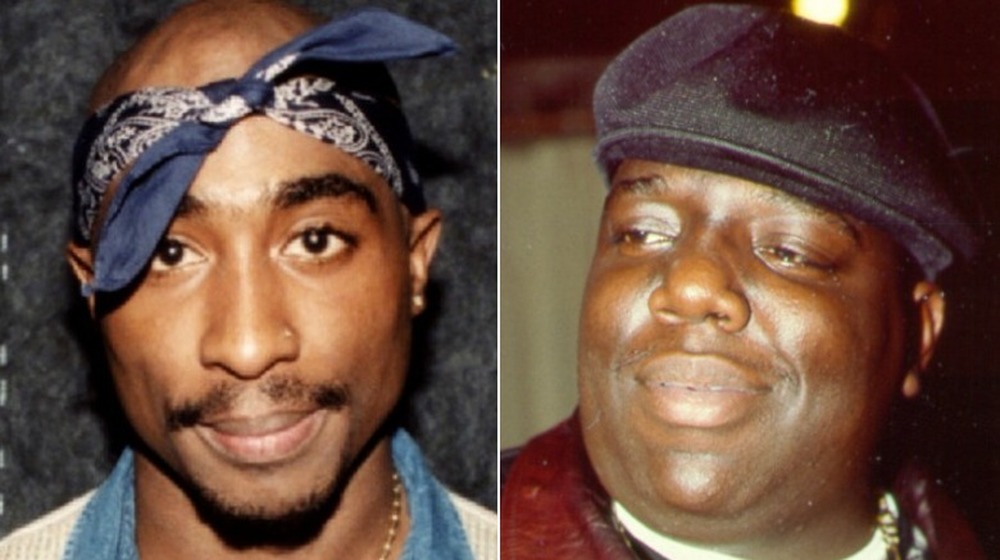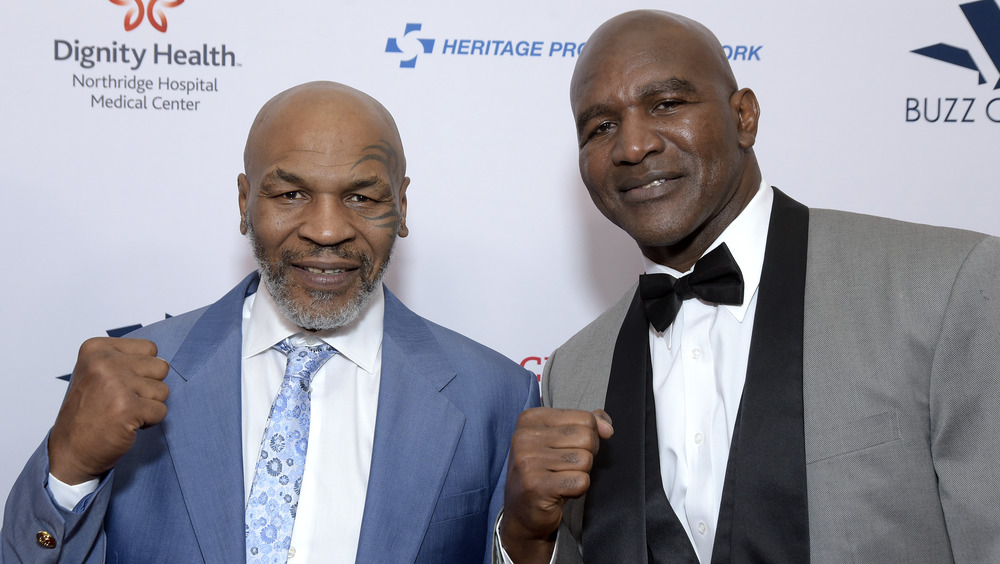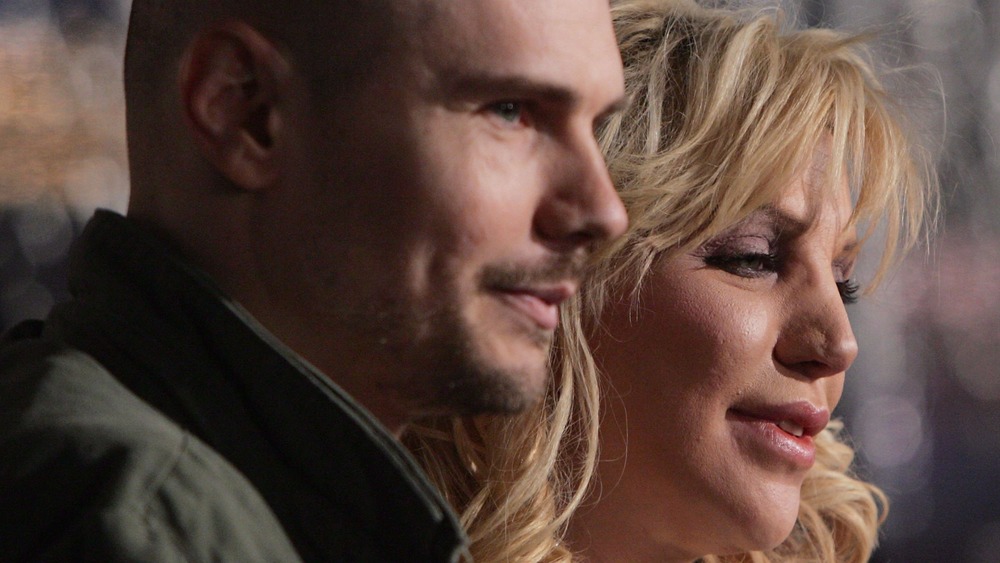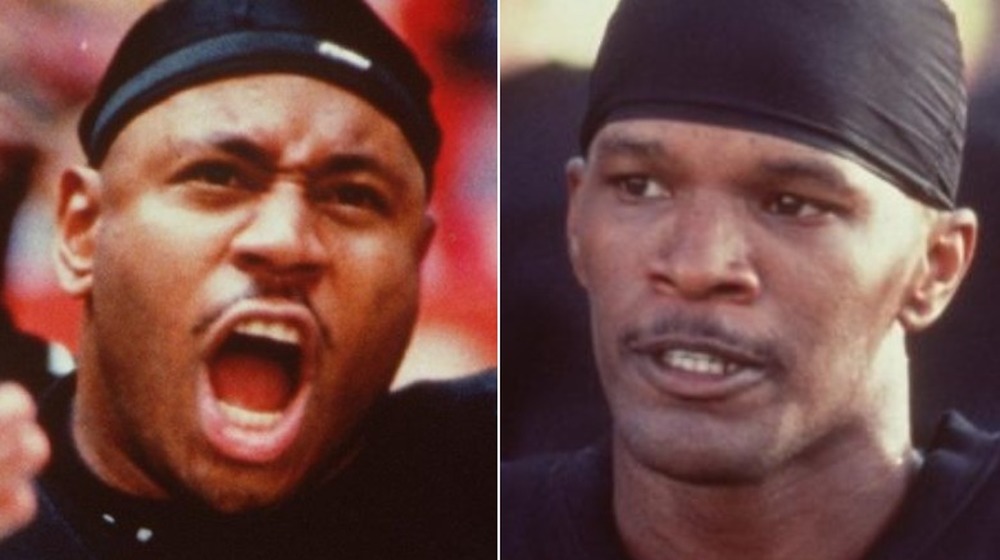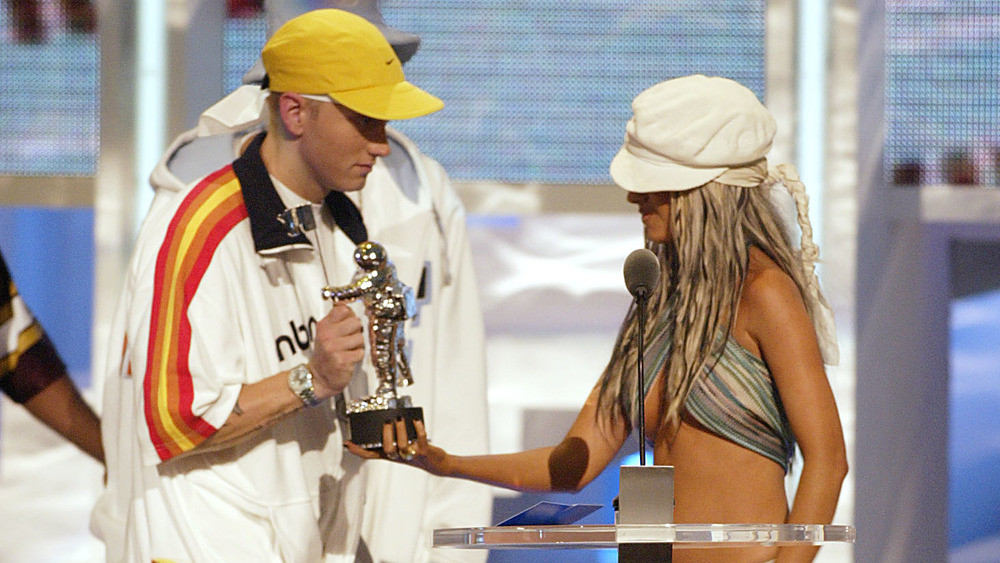The Biggest Celebrity Feud The Year You Were Born
Judging from the anecdotes they tell on talk shows and the behind-the-scenes photos they post on Instagram, it seems like all movie stars, rock stars, and other physically attractive famous people absolutely love each other, their work, and getting the chance to work alongside one another. That's mostly all PR-driven nonsense, of course, because celebrities are human beings — and sometimes, two people do not, cannot, and will not get along with each other.
Occasionally, two celebs will reject those unofficial rules of comportment and engage in verbal or even physical combat, airing their grievances with one another loudly and publicly. These feuds are fascinating and ugly, the entertainment news equivalent of rubbernecking at a car accident. Here are some of the biggest celebrity squabbles, divorce battles, custody fights, family disputes, professional disagreements, and high-level backstabbings in Hollywood history, dating back to the mid-1980s. What were tongues wagging over the year you were born?
1985: Michael Jackson and Paul McCartney
At one point in time, Michael Jackson and Paul McCartney were friends. According to Far Out, they connected in the late '70s, when McCartney offered Jackson the chance to record his song, "Girlfriend." Jackson passed, but McCartney later duetted with the Jackson 5 alum on Thriller's "The Girl is Mine," and Jackson would feature on the ex-Beatle's hit, "Say, Say, Say."
Pop History Dig reports that McCartney recommended to Jackson that he invest the huge financial windfall he received from the blockbuster sales of Thriller into music publishing — buying the rights to well-known songs, and thus earning their lucrative royalties. Per Mental Floss, McCartney had recently "lost his stake" in the company he'd started to control The Beatles' catalogue, Northern Songs. Meanwhile, Jackson started to buy up '60s pop songs until 1984, when music publisher ATV was being sold. The gem of its collection: the rights to 251 Beatles songs. McCartney passed because the price tag was too high, but then another figure bit $47.5 million, way beyond initial estimates. That man was Jackson, who spent most of 1985 negotiating the deal with ATV's former owners.
McCartney told Jackson to buy songs, and so Jackson bought McCartney's songs, in other words. That set off a nasty feud that would last until the end of Jackson's life in 2009. McCartney told the New York Post (via ABC News) that the King of Pop thought his moves were "just business." Ruthless and publicly friendship-ending, but business nonetheless, it would seem.
1986: Johnny Carson and Joan Rivers
According to Biography, comedian Joan Rivers performed on The Tonight Show Starring Johnny Carson for the first time in 1965, and did so well (per The Hollywood Reporter) that Carson told her that she was "gonna be a star." He helped to make that happen, as Rivers appeared on The Tonight Show many times, and by the early '80s, she was one of Carson's permanent guest-hosts — helming The Tonight Show when he was taking one of his many vacation days.
That relationship abruptly ended in 1986, when the brand new Fox network launched a Tonight Show competitor called The Late Show Starring Joan Rivers. Rivers told THR that the "first person" she called when she was offered her own show was Carson, which he disputed to the media throughout the year. Since he was the "King of Late Night," his story became the one people believed.
Still, he iced her out. "I would see him in a restaurant and go over and say hello. He wouldn't talk to me," Rivers claimed, adding that Carson never got upset when other guest-hosts left for their own Tonight Show-styled shows. She added, "I think it was a question of, 'I found you, and you're my property.' He didn't like that as a woman, I went up against him." Carson died in 2005, having "never" spoken to Rivers again after her defection to Fox, which was quickly canceled — crushed in the ratings by The Tonight Show.
1987: Mark Harmon and Kristin Nelson
Kristin Nelson appeared on 30 episodes of The Adventures of Ozzie and Harriet and other mid-century TV shows like Green Acres and Adam-12. She was more famous because of the company she kept — per People, at age 18 in 1963, she married rock star Rick Nelson (son of Ozzie and Harriet Nelson). Kristen was the offspring of celebrities, too, as the daughter of Heisman Trophy-winner Tom Harmon. Her younger brother: Mark Harmon, who, by 1987, was a major celebrity, starring on TV's St. Elsewhere, Summer School on the big screen, and chosen as the reigning People's "Sexiest Man Alive."
Never before or since were people paying more attention to Mark Harmon than in 1987. Throughout the '70s, as she told People that year, Kristin and her husband had a tumultuous, drug-tainted marriage, and she filed for divorce in 1980. Soon after, she took a $200-a-week job as an assistant casting director and told the media that her family wouldn't help her out (but that wasn't necessarily true — her parents bought her a house, and raised her son, Sam, for 18 months).
Rick's 1985 death in a plane crash sent Kristin back into drug abuse, and brother Mark persuaded her to enter rehab. She got out in 1987, only to learn that the future NCIS star was suing for custody of Sam, whom he and wife Pam Dawber had raised in his mother's absence. After an ugly court battle, Kristin won custody while Mark got visitation rights.
1988: Joan Collins and Jackie Collins
Two kids in the Collins family grew up to be famous, each for very different things — but both tapped into 1980s' audiences appetites for glamorous rich people behaving badly. Joan Collins had appeared in dozens of movies, TV shows, and made-for-TV movies since the early 1950s, but found her signature role in 1981 as Alexis Carrington Colby on ABC's campy and glitzy primetime soap, Dynasty.
Her younger sister by four years, Jackie Collins, did a little acting in the '50s and '60s, too, but found much more success as the author of tawdry, soapy novels, hitting her stride in the 1980s with the likes of Hollywood Wives and Lucky. According to The Hollywood Reporter, she sold over 500 million copies of her many books, making her one of the most commercially successful novelists ever.
In 1988, Joan published Prime Time, a salacious novel about life on the set of a Dynasty-esque show. According to the Daily Mail, that caused a deep rift between the sisters, as Jackie reportedly didn't appreciate Joan "crowding" what she felt was "her territory," per editor Michael Korda. The book ultimately sold about 350,000 copies, a fraction of what a Jackie Collins novel would move. And while the famous British sisters publicly denied their beef, Joan was later quoted as saying, "I love my sister, but I'm not as close to her as I used to be. I don't think she was thrilled when I started writing."
1989: Clint Eastwood and Sondra Locke
All-time movie legend Clint Eastwood and rising star Sondra Locke became acquainted on the set of The Outlaw Josey Wales in 1975, and soon moved in together, according to The Hollywood Reporter. Locke would later claim that Eastwood was so possessive that he would barely allow Locke, his companion but never wife, to act in any movies in which he didn't also star, or at least direct.
More details of a strained relationship, and allegations of Eastwood's need for extreme control, surfaced in 1989, when the couple split up. According to The Wrap, Locke found out that Eastwood and his mistress had secretly welcomed children — especially hurtful to Locke, as she claimed that Eastwood all but forced her to terminate two pregnancies and undergo a tubal ligation, per the Los Angeles Times.
Eastwood moved out in early 1989, and Locke filed a lawsuit to receive palimony (similar to a divorce financial settlement, but for unmarried couples), for which she received a three-year, $1.5 million deal with Warner Bros. to develop and direct movies, a.k.a. Eastwood's longtime filmmaking home. However, Locke later would allege in a 1995 fraud suit that Eastwood had such sway at the studio that he essentially had her blacklisted — Warner never produced any of the dozens of films she pitched, and never hired her to direct anything. Per her lawyer (via THR), the deal essentially "created a dead end for her career."
1990: Sinead O'Connor and Frank Sinatra
Sinead O'Connor was one of the newest and biggest stars in the world in 1990. After a decade of smiling, big-haired divas who participated in their own commodification to move units for their labels, here came O'Connor — highly and controversially political, dour, outspoken, and bald. But boy, could she sing: Her powerful, emotionally devastating cover of the obscure Prince song, "Nothing Compares 2 U," went to No. 1 in the United States and earned her three Grammy Award nominations.
Not feeling the love? American musical icon and classic crooner Frank Sinatra. In the summer of 1990, the Daily Kent Stater reported that if "The Star Spangled Banner" was played before she took the stage (as was customary), O'Connor wouldn't perform her scheduled concert in New Jersey. At his own concert, the Garden State-born Sinatra called for the Irish O'Connor to "leave the country." Seemingly threatening violence, the then-70-something singer added, "Her behavior is unforgivable. For her sake, we'd better never meet."
While it never came to blows, O'Connor responded in Rolling Stone, saying that Sinatra's behavior "scared the s**t out of[her]" for a while. "And obviously the man has a problem with women — obviously he has," she added. "But I don't have any problem with him."
1991: Jay Leno and David Letterman
Jay Leno and David Letterman came from the same world. Both were among the top performers in Los Angeles' burgeoning stand-up comedy scene of the 1970s, and both became late-night talk show hosts in the 1980s. Letterman took his style (ironic, progressive, absurd) to NBC's Late Night with David Letterman, while Leno (observational, mainstream, populist) was installed as a regular guest host on The Tonight Show, the program which came on just before Letterman's.
In 1991, Tonight Show host Johnny Carson announced his upcoming retirement after nearly three decades on air, triggering a succession war that NBC executives badly botched, according to The New York Times. Letterman assumed that, as the host of Late Night, the The Tonight Show would be his, while network brass preferred the non-edgy Leno. However, they didn't want to lose either candidate to a rival network eager to set up its own Tonight Show competitor, so at various points, NBC had seemingly led both men to believe the job was theirs, per The Baltimore Sun. When the dust settled, Leno became host of The Tonight Show in early 1992, and Letterman left NBC for CBS to headline The Late Show.
In 2013, after another battle for The Tonight Show, which found Leno un-retiring and taking back the program from successor Conan O'Brien, Letterman told Oprah's Next Chapter that Leno was "the funniest guy I've ever known" and "also maybe the most insecure person I have ever known."
1992: Woody Allen and Mia Farrow
By 1979, Mia Farrow was best known for her work in the films Rosemary's Baby and The Great Gatsby, as well as her high-profile relationships with Frank Sinatra and composer André Previn. That year, per The New York Times, she met and entered into a long romance with filmmaker Woody Allen, who would cast her in more than a dozen of his projects, including Hannah and Her Sisters and The Purple Rose of Cairo. The two never married, but Farrow built a family, adopting son Moses in 1980 and daughter Dylan in 1985.
In 1991, Allen formally co-adopted both kids, but not then-21-year-old Soon-Yi Previn, Farrow's oldest, whom she'd cared for since before she began seeing Allen. Instead, Allen started secretly dating Soon-Yi — his domestic partner's adopted daughter. Farrow discovered the affair in January 1992, after finding nude photos of Previn in Allen's possession.
What would be a weird celebrity split story (with a touch of near-incest) took an even darker and more alarming turn later that same year. In a Vanity Fair profile, Farrow alleged that Allen had molested Dylan that summer at the couple's Connecticut home. Police declined to press charges, as social services workers couldn't acquire credible evidence of the abuse. Allen then accused Farrow of making up bogus charges because she was bitter over his affair with Soon-Yi, and he sued his former partner for custody of their minor children, but he lost, per HUFFPOST.
1993: Burt Reynolds and Loni Anderson
The year 1993 was not a peak period for Burt Reynolds or Loni Anderson. Long gone were the years in which he was a box office dynamo and macho sex symbol because of Smokey and the Bandit and The Cannonball Run, and her acclaimed sitcom, WKRP in Cincinnati, had been off the air for a decade, with an early '90s reboot failing to take off. Their personal lives also crumbled that year: Reynolds filed for divorce after just five years of matrimony (and 11 years together), per the Los Angeles Times.
The once golden couple of Hollywood took their dispute embarrassingly public. "I caught her cheating on me," Reynolds claimed on an August 1993 edition of Good Morning America: Evening Edition (via People). "I made a decision to call it off," he added, while also confirming that, after he believed Anderson was having an affair, he started a dalliance of his own outside of his marriage. He also claimed that his ex was a terrible mom to their young son. Beyond that, Reynolds told viewers that he and Anderson hadn't had marital relations in three years.
For her part, Anderson released a statement (via the Orlando Sentinel), citing her refusal to respond to Reynolds. After much more public sniping, the couple finalized their divorce in December 1994.
1994: Nick Nolte and Julia Roberts
The 1994 movie, I Love Trouble, was supposed to be a good, old-fashioned newspaper picture, starring America's sweetheart Julia Roberts as an energetic, up-and-coming reporter, and brooding tough-guy actor Nick Nolte as an aging, womanizing crank of a columnist at a rival paper. They don't get along, but of course, they fall in love at the end — but only the first part of that story happened off-screen for Roberts and Nolte.
According to the Los Angeles Times, they clashed pretty much from the production's get go, with sources claiming that many of the stars' scenes were shot with just one actor playing to a stand-in. So, what was the problem? Nolte was apparently too macho for Roberts' taste, so she reportedly openly mocked him on the set. For his part, Nolte supposedly grew so tired of Roberts' alleged diva-like behavior that he'd purposely try to push her buttons. Per The Telegraph, "Their mutual distaste translated into a distinct lack of on-screen chemistry." That's never a good sign for a rom-com.
After the film hit theaters (and bombed), Roberts disparaged Nolte in The New York Times, calling him "completely disgusting." Nolte responded in kind: "She's not a nice person. Everyone knows that."
1995: Prince Charles and Princess Diana
The celebrity gossip and paparazzi industries reported and speculated on every nuance, detail, twist, and turn in the marriage of Prince Charles, heir to the throne of the United Kingdom, and his wife, the former Diana Spencer (a.k.a. the People's Princess) — from their storybook wedding, which was watched by millions on television in 1981, to when it all came to an end in the 1990s. The pair announced they were separating in 1992, but continued to make public appearances as royals for a few more years.
Reconciliation seemed unlikely, if not possible, as of November 1995, when the BBC aired a tell-all interview with Princess Diana, conducted by journalist Martin Bashir — arranged without the knowledge of the rest of the royal family, according to Time. While Charles had previously come clean about to a years-long extramarital affair with his old love (and future second wife) Camilla Parker Bowles, Diana revealed pretty much everything that had ever gone wrong in her time with her husband. As she infamously said, "There were three of us in this marriage, so it was a bit crowded." Diana even admitted that she'd had a five-year fling with military officer James Hewitt.
Within weeks of the interview airing, Queen Elizabeth (Charles' mother) sent a letter to the couple persuading them to just get divorced already. And they did, in August 1996.
1996: 2Pac and The Notorious B.I.G.
High-profile hip-hop has often been an audio turf war, with different acts proudly representing their geographic point of origin. In 1996, such posturing reached new heights in what came to be known as "the East Coast-West Coast rivalry," according to The Washington Post. On one side, there was Puff Daddy's New York-based Bad Boy Entertainment, featuring Christopher Wallace (or, the Notorious B.I.G.). Out West was Los Angeles' Death Row Records, best represented by 2Pac (Tupac Shakur).
In 1994, Shakur was shot at a New York recording studio, which the rapper attributed to the Bad Boy contingent, who denied involvement in a 1995 issue of Vibe. Weeks later, Death Row CEO Suge Knight teased Puff Daddy from the stage of a music awards show, prompting the entrepreneur to skip an October 1995 industry conference because of threats by Knight. After that, Randy Walker, whom Shakur had previously implicated in his shooting, was found dead in New York. Flash forward to mid-1996: Shakur's "2 of Americaz Most Wanted" video featured a scene of violence levied on B.I.G. and Puffy lookalikes. Then Shakur released the song "Hit 'Em Up," in which he claimed to have bedded Wallace's wife.
In the end, neither rapper truly won the war, because they were both murdered, per The New York Times. Shakur died from gunshot wounds suffered in a Las Vegas drive-by shooting in September 1996, while Wallace died after being gunned down in Los Angeles the following March.
1997: Mike Tyson and Evander Holyfield
Mike Tyson had a storied boxing career, which included a heavyweight title at age 19 and a 36-bout winning streak. His most dominant successor: Evander Holyfield, who rose to the top of the boxing world in the 1990s, during which time Tyson was unable to fight because he was imprisoned on a rape charge. Released in 1995, he staged a comeback, but lost to Holyfield in a November 1996 fight at the MGM Grand. Tyson wanted another shot at glory, and he agreed to a rematch at the same venue in June 1997.
Holyfield outboxed Tyson early on, and he even head-butted his opponent and drew blood, per BBC News. Tyson came unleashed in the third round, pummeling Holyfield and capping off his attack by biting down on the boxer's ear. Tyson actually tore off a large "chunk" from Holyfield's ear, and then spit it onto the ground, according to ESPN. Holyfield, in much pain, pushed Tyson away as the referee ended the match. But Tyson wasn't done yet, launching an attack on the bloodied Holyfield from behind. Holyfield later said that he "was ready to tackle him, and throw him down."
The fight was ruled a win for Holyfield, via disqualification for Tyson, who had his boxing license suspended for 15 months. When promoting his first comeback fight, Tyson told reporters (via BBC News), "I would do it again if provoked. I would do it again under the same circumstances."
1998: Courtney Love and Billy Corgan
Grunge rock faded away not long after the death of Nirvana leader Kurt Cobain in 1994. The style made its last stand in 1998 with two major releases: Smashing Pumpkins' Ava Adore, and Hole's Celebrity Skin. Billy Corgan had a hand in both — he was the frontman and chief musical architect of Smashing Pumpkins and helped Hole leader Courtney Love write songs for the latter. According to Love in the documentary Montage of Heck (via Alternative Nation), the two had dated in the early '90s — she accompanied Corgan on a European tour in 1991, but when he refused to pay for her trip back to the U.S., she headed back with Nirvana.
From there, she quickly fell in love with and married Cobain, only to rekindle things with Corgan in the months after the Nirvana frontman's death by suicide. They stayed friendly, but not after Corgan trashed Celebrity Skin, telling Rolling Stone in 1998 that the whole endeavor left a "bad taste in [his] mouth."
Love, meanwhile, downplayed the extent of the contributions of Corgan, who billed himself as the Hole singer's "svengali." "Billy does not have a majority of publishing percentage on any one of those songs," Love told USA Today (via Rolling Stone). "I feel it's silly and somewhat sexist to credit Billy Corgan with things Billy Corgan did not do based on the assumption that accomplished male musicians are somehow superior to accomplished female musicians, such as myself."
1999: LL Cool J and Jamie Foxx
In 1999, Oliver Stone, the writer and director of aggressively truth-telling films about the horrors of war (Platoon) and politics (Nixon), set his sights on making Any Given Sunday, a visceral and intense movie about professional football. He assembled an all-star cast, including LL Cool J (or James Todd Smith) as careerist running back "J-Man" Washington, and Jamie Foxx as arrogant backup quarterback "Steamin'" Willie Beaman. There's a lot of hostility between those two characters, which apparently seeped off the script and into real life.
While taping a scene at Miami's Pro Player Stadium in February 1999, according to MTV News, Smith reportedly "push[ed]" Foxx and "punched him" in his helmet-covered face — unscripted actions ostensibly in character — and the two men agreed that Smith would give a warning next time. But then Smith reportedly hit Foxx in the "back of the head," angering him so much that he retaliated with a smack to the face. Police were eventually called to set, but no charges were filed.
None other than Al Pacino had attempted to break up the fight at one point, and later chalked the whole ordeal up simply to The Ringer: "They're young actors. I think they started mirroring their roles in the film, antagonistic with one another. I think it just carried over." However, Smith and Foxx would continue a cold war for years, ultimately making up at the 2005 Academy Awards, per MTV News.
2000: Christina Aguilera and Eminem
In the Y2K-era, TRL dominated popular music and youth culture. The MTV after-school video countdown show pitted two distinct camps against each other: the kids who loved bubblegum pop like the Backstreet Boys and Britney Spears, and the edgy teens who voted for rock and rap acts such as Korn and Limp Bizkit. This fight for the very soul of young America was encapsulated in a feud between two TRL stalwarts: pop princess Christina Aguilera and rapper Eminem.
The disagreement began in earnest in 1999, per NME, when Aguilera broke the news on MTV that Eminem had secretly married his girlfriend, Kim. That prompted the rapper to call Aguilera out on "The Real Slim Shady," the first single off his 2000 album, The Marshall Mathers LP. To Whit (via Genius): "Little b**ch put me on blast on MTV / 'Yeah, he's cute, but I think he's married to Kim, hee-hee' / I should download her audio on MP3 / And show the whole world how you gave Eminem VD." (That's a bit of a self-own, and a really dated one at that, but still aggressive toward Aguilera.)
Aguilera denied that she'd ever been with Eminem in such a carnal manner, but it was believed that she released a cringe-inducing diss song/parody of "The Real Slim Shady," imploring Eminem to "please shut up." Plot twist? Aguilera actually had nothing to do with the tune, which Entertainment Weekly later attributed to performer Emily Ellis. But it certainly kept the feud headline-worthy, and Aguilera personally found it "hilarious."

